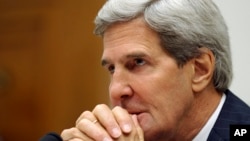WHITE HOUSE —
Secretary of State John Kerry is heading to Geneva to talk with Russian Foreign Minister Sergey Lavrov about Syrian President Bashar al-Assad's arsenal of chemical weapons. U.S. officials are not placing a timeline on the diplomatic process, and they note military action is still a possibility.
White House press secretary Jay Carney told reporters Wednesday the negotiations will take some time.
“The process by which chemical weapons would be identified, verified, secured and removed from Assad’s control is obviously a complicated one, and that will be discussed in Geneva and, I am sure, in New York," said Carney.
While the Obama administration acknowledges that the process cannot be completed quickly, Carney says that is not an excuse for delay.
“We are not interested in delay or avoidance. We have ample reason to be skeptical about Syria’s commitments and intentions, but you do not negotiate these kinds of things with partners that have always been willing or with interlocutors that have always been helpful. You would not have to," he said.
Kerry and Lavrov will discuss an initiative, supported by Russia and accepted by Syria, under which Syria will turn over its chemical weapons to the United Nations.
The president has said the United States is still poised to launch military strikes on Syria if diplomacy fails. He said the credible threat of U.S. military action is part of the reason for the recent advances in diplomacy.
At the White House, spokesman Carney put pressure on Russia to continue moving the process forward. He said Russia is “putting its prestige on the line.”
At the State Department, spokeswoman Jen Psaki says U.S. diplomats will have tough criteria for success.
"Let me first say that details matter. We're not predetermining or pre-suggesting that we're going to approve of whatever proposal we talk through over the next several days. It has to be credible. It has to be verifiable. And certainly we believe in the engagement and the involvement of the international community," said Psaki.
Obama has asked Congress to delay a vote on authorizing U.S. military action against Syria. But some lawmakers say they could start voting on such a resolution as soon as next week if the diplomatic efforts are not successful.
White House press secretary Jay Carney told reporters Wednesday the negotiations will take some time.
“The process by which chemical weapons would be identified, verified, secured and removed from Assad’s control is obviously a complicated one, and that will be discussed in Geneva and, I am sure, in New York," said Carney.
While the Obama administration acknowledges that the process cannot be completed quickly, Carney says that is not an excuse for delay.
“We are not interested in delay or avoidance. We have ample reason to be skeptical about Syria’s commitments and intentions, but you do not negotiate these kinds of things with partners that have always been willing or with interlocutors that have always been helpful. You would not have to," he said.
Kerry and Lavrov will discuss an initiative, supported by Russia and accepted by Syria, under which Syria will turn over its chemical weapons to the United Nations.
The president has said the United States is still poised to launch military strikes on Syria if diplomacy fails. He said the credible threat of U.S. military action is part of the reason for the recent advances in diplomacy.
At the White House, spokesman Carney put pressure on Russia to continue moving the process forward. He said Russia is “putting its prestige on the line.”
At the State Department, spokeswoman Jen Psaki says U.S. diplomats will have tough criteria for success.
"Let me first say that details matter. We're not predetermining or pre-suggesting that we're going to approve of whatever proposal we talk through over the next several days. It has to be credible. It has to be verifiable. And certainly we believe in the engagement and the involvement of the international community," said Psaki.
Obama has asked Congress to delay a vote on authorizing U.S. military action against Syria. But some lawmakers say they could start voting on such a resolution as soon as next week if the diplomatic efforts are not successful.




